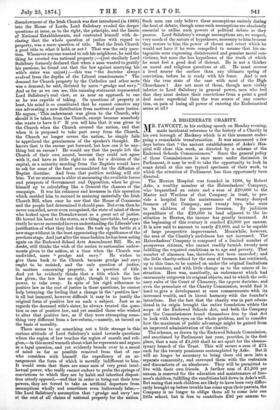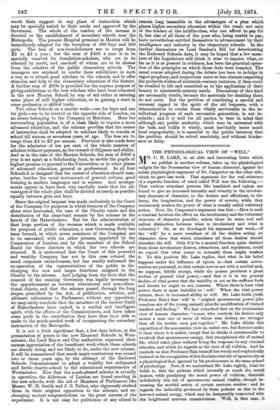A REGENERATE CHARITY.
MR. FAWCETT, in his striking speech on Monday evening, made incidental reference to the history of a Charity in his own borough of Hackney which is at this moment under- going a remarkable transformation. It was announced a few days before that " the ancient establishment of Aske's Hos- pital will close this week, as directed by a scheme of the Endowed Schools Commissioners." Since the general policy of those Commissioners is once more under discussion in Parliament, it may be well to take the opportunity to look in some detail at this one typical specimen of their work, to which the attention of Parliament has thus opportunely been directed.
The Hoxton Hospital was founded in 1688, by Robert Aske, a wealthy member of the Haberdashers' Company, who bequeathed an estate and a sum of £20,000 to the Master and Wardens of that Company in trust, to pro- vide a hospital for the maintenance of twenty decayed freemen of the Company, and twenty boys, who were
to be children of the poorer freemen. By judicious expenditure of the £20,000 in land adjacent to the in- stitution in Hoxton, the income has greatly increased. At the beginning of this century it reached £3,000 per annum. It is now said to amount to nearly £9,000, and to be capable of large prospective improvement. Meanwhile, however, the area of the Charity's usefulness has not increased. The Haberdashers' Company is composed of a limited number of prosperous citizens, who cannot readily furnish twenty men fulfilling the required conditions as to age and poverty. That number of ahnsmen has, therefore, not been exceeded ; and the little charity-school for the sons of freemen has continued, up to this time, to be carried on under the original limitations as to numbers, and with little change as to the course of in- struction. Here was, manifestly, an endowment which had enormously outgrown its original objects, and to which the ordi- nary rules of the Court of Chancery, the cy-pres doctrine, and even the procedure of the Charity Commission, would find it hard to give a development at once commensurate with its increased wealth, and in literal harmony with the founder's intentions. But the fact that the charity was in part educa tional in its origin brought the entire foundation within the scope of the Endowed Schools Act, and both the Company and the Commissioners found themselves free by that Act to look with fresh eyes on the whole problem, and to consider how the maximum of public advantage might be gained from an improved administration of the charity.
The scheme, as drawn by the Endowed Schools Commission, and sanctioned by Parliament last year, provides, in the first place, that a sum of £1,500 shall be set apait for the eleemo- synary branch of the Trust. This will secure a sum of £75 each for the twenty pensioners contemplated by Aske. But it will no longer be necessary to bring these old men into a separate community, and surround them with the restraints and discomforts of an almshouse. They will be permitted to live with their own friends. A further sum of £1,200 per
annum is reserved for the education and maintenance of free- men's children, fulfilling the conditions laid down in Aske's will.
But seeing that such children are likely to have been very differ- ently brought up before trouble has come upon their parents, the Company is no longer to oblige them all to come into one little school, but is free to contribute £40 per annum to-
wards their support in any place of instruction which may be specially suited to their needs and approved by the Governors. The whole of the residue of the income is devoted to the establishment of secondary schools near the Metropolis. The present Hospital premises in Roston will be immediately adapted for the reception of 300 boys and 300 girls. The fees of non-foundationers are to range from £2 to £4 a year ; but the sum of £400 a year is to be specially reserved for foundation-scholars, who are to be selected by merit, and one-half of whom are to be chosen from the scholars of the public elementary schools. The managers are enjoined to confer these exhibitions in such a way as to attract good scholars to the schools, and to offer stimulus and help to the elementary education of the district. A further sum of £600 is provided for the express purpose of giving exhibitions to the best scholars who have been educated in the new Hoxton School, by way of aid either in entering some place of still higher education, or in gaining a start in some profession or skilled trade.
Two other Schools on a similar scale—one for boys and one for girls—are to be erected on the opposite side of London, on an estate belonging to the Company at Hatcbam. Here the surrounding population is of a class likely to require a more advanced education, and the scheme provides that the course of instruction shall be adapted to scholars likely to remain at school till sixteen or seventeen years of age. The fees are to Lange from £4 to £8 per annum. Provision is also made here for the admission of ten per cent. of the whole number of scholars without payment, as the reward of diligence and ability. And as in the case of the Hoxton Schools, the sum of £600 a year is set apart as a Scholarship fund, to enable the pupils of highest promise to proceed to the Universities or to other places of advanced education, general or professional. In all four Schools it is designed that the course of education should com- prise, besides the usual instruments of general culture, good training in modern languages and in science. And arrange- ments appear to have been very carefully made that the ad- vantages of the whole plan shall be divided as nearly as possible equally between girls and boys.
Since the original bequest was made exclusively to the Court of the Company for purposes in which freemen of the Company alone were interested, the care of the Charity estate and the distribution of the alms-fund remain by the scheme in the hands of the Haberdashers. But for the administration of that large portion of the revenue which is made available for purposes of public education, a new Governing Body has been formed, in which seven nominees of the Company are to be associated with six other persons, appointed by the Corporation of London, and by the members of the School Board for those districts in which the two schools are situated. It is understood that the Court of this powerful and wealthy Company has not in this case evinced the usual corporate exclusiveness, but has readily welcomed the co-operation of the representatives of the public in dis- charging the new and larger functions assigned to the Charity by the scheme. And judging from the facts that the consent of the existing Governors was legally necessary to the apportionment as between educational and non-educa- tional objects, and that the scheme passed through the long stages, prescribed by the Act, of publication, revision, and ultimate submission to Parliament, without any opposition, we may safely conclude that the members of the ancient Guild of Haberdashers have united, in a cordial and intelligent spirit, with the efforts of the Commissioners, and have taken some pride in the contribution they have thus been able to make to the much-needed work of reorganising the secondary instruction of the Metropolis.
It is not a little significant that, a few days before, at the presentation of prizes in the new Emanuel Schools in West- minster, the Lord Mayor and City authorities expressed their earnest appreciation of the beneficent work which those schools are already doing, and are likely to do, under the new scheme. It will be remembered that much angry controversy was roused two or three years ago, by the attempt of the Endowed Schools Commissioners to adapt a wealthy but antiquated and feeble charity-school to the educational requirements of Westminster. Now that the much-abused scheme is actually in operation, the Aldermen of London are found meeting in the new schools, with the aid of Members of Parliament like Messrs. W. H. Smith and J. G. Talbot, who vigorously abetted them in their original opposition to the scheme, and ex- changing mutual congratulations on the great success of the experiment. It is not easy for politicians of any school to remain long insensible to the advantages of a plan which places higher secondary education within the reach not only of the traders of the middle-class, who can afford to pay for it, but also of all those of the poor who, being unable to pay, have nevertheless entitled themselves to advancement by their intelligence and industry in the elementary schools. In the further discussions on Lord Sandon's Bill for deteriorating the Endowed Schools Acta, it may be hoped that a few mem- bers of the Legislature will think it wise to inquire what, so far as it is at present in evidence, has been the practical opera- tion of the principles on which those Acts were founded. The usual course adopted during the debate has been to indulge in vague prophecy, and conjectures more or less obscure respecting the probable wishes of sixteenth-century testators, if they could be recalled to life and consulted as to the application of their bounty to nineteenth-century needs. Discussions of this kind are necessarily sterile, because the materials for deciding them do not exist. But the problem of combining a careful and reverent regard to the spirit of the old bequests, with a determination to render them vitally serviceable to the in- tellectual progress of each successive generation, is not in- soluble ; and it is well for all parties to bear in mind that although any public authority which may be entrusted with the task, and fulfils it wisely, must inevitably incur much local unpopularity, it is essential to the public interests that the problem should be solved resolutely, and without hinder- ance or delay.



































 Previous page
Previous page